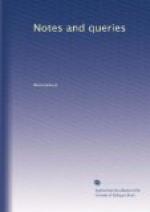“As glorious as the morning wash’d with dew.”—p. 203
As the morning does not derive its glory from the circumstance of its being “wash’d with dew,” and as it is not a peculiarly apposite comparison, I conclude that here, too, as in other instances, the sound alone has caught the ear of the imitator.
In Act V. Sc. 2., Katharine says,—
“Then vail your stomachs; for it
is no boot;
And place your hand below your husband’s
foot;
In token of which duty, if he please,
My hand is ready: may it do him ease.”
Though Shakspeare was, in general, a most correct and careful writer, that he sometimes wrote hastily it would be vain to deny. In the third line of the foregoing extract, the meaning clearly is, “as which token of duty;” and it is the performance of this “token of duty” which Katharine hopes may “do him ease.” The imitator, as usual, has caught something of the words of the original which he has laboured to reproduce at a most unusual sacrifice of grammar and sense; the following passage appearing to represent that the wives, by laying their hands under their husbands’ feet—no reference being made to the act as a token of duty—in some unexplained manner, “might procure them ease.”
“Laying our hands under their feet
to tread,
If that by that we might procure their
ease,
And, for a precedent, I’ll first
begin
And lay my hand under my husband’s
feet.”—p. 213.
One more instance, and I have done. Shakspeare has imparted a dashing humorous character to this play, exemplified, among other peculiarities, by such rhyming of following words as—
“Haply to wive and thrive as least I may.”
“We will have rings and things and fine array.”
“With ruffs, and cuffs, and farthingales and things.”
I quote these to show that the habit was Shakspeare’s. In Act I. Sc. 1. occurs the passage—“that would thoroughly woo her, wed her, and bed her, and rid the house of her.” The sequence here is perfectly natural: but observe the change: in Ferando’s first interview with Kate, he says,—
“My mind, sweet Kate, doth say I
am the man
Must wed and bed and marrie bonnie
Kate.”—p. 172.
In the last scene, Petruchio says,—
“Come, Kate, we’ll to bed:
We three are married, but you two are
sped.”
Ferando has it thus:—
“’Tis Kate and I am wed, and
you are sped:
And so, farewell, for we will to our bed.”—p.
214.
Is it not evident that Shakespeare chose the word “sped” as a rhyme to “bed,” and that the imitator, in endeavouring to recollect the jingle, has not only spoiled the rhyme, but missed the fact that all “three” were “married,” notwithstanding that “two” were “sped”?




